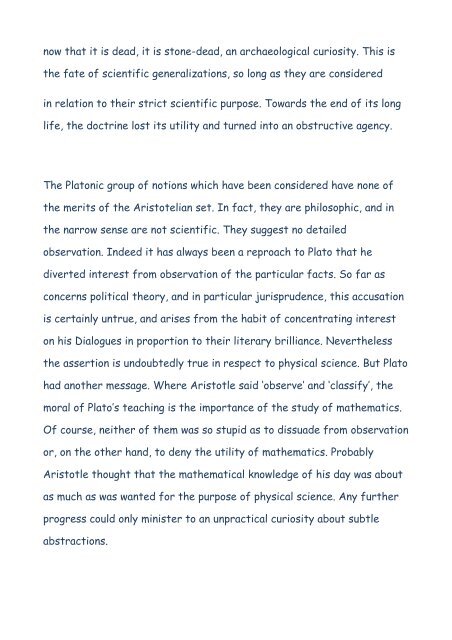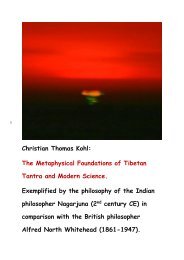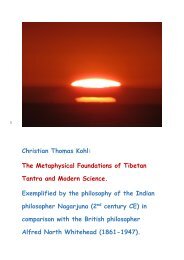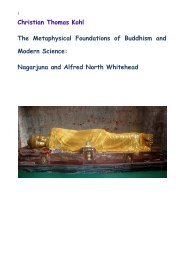Christian Thomas Kohl The Metaphysical Foundations of Buddhism and Modern Science
Christian Thomas Kohl The Metaphysical Foundations of Buddhism and Modern Science
Christian Thomas Kohl The Metaphysical Foundations of Buddhism and Modern Science
Create successful ePaper yourself
Turn your PDF publications into a flip-book with our unique Google optimized e-Paper software.
now that it is dead, it is stone-dead, an archaeological curiosity. This is<br />
the fate <strong>of</strong> scientific generalizations, so long as they are considered<br />
in relation to their strict scientific purpose. Towards the end <strong>of</strong> its long<br />
life, the doctrine lost its utility <strong>and</strong> turned into an obstructive agency.<br />
<strong>The</strong> Platonic group <strong>of</strong> notions which have been considered have none <strong>of</strong><br />
the merits <strong>of</strong> the Aristotelian set. In fact, they are philosophic, <strong>and</strong> in<br />
the narrow sense are not scientific. <strong>The</strong>y suggest no detailed<br />
observation. Indeed it has always been a reproach to Plato that he<br />
diverted interest from observation <strong>of</strong> the particular facts. So far as<br />
concerns political theory, <strong>and</strong> in particular jurisprudence, this accusation<br />
is certainly untrue, <strong>and</strong> arises from the habit <strong>of</strong> concentrating interest<br />
on his Dialogues in proportion to their literary brilliance. Nevertheless<br />
the assertion is undoubtedly true in respect to physical science. But Plato<br />
had another message. Where Aristotle said ‘observe’ <strong>and</strong> ‘classify’, the<br />
moral <strong>of</strong> Plato’s teaching is the importance <strong>of</strong> the study <strong>of</strong> mathematics.<br />
Of course, neither <strong>of</strong> them was so stupid as to dissuade from observation<br />
or, on the other h<strong>and</strong>, to deny the utility <strong>of</strong> mathematics. Probably<br />
Aristotle thought that the mathematical knowledge <strong>of</strong> his day was about<br />
as much as was wanted for the purpose <strong>of</strong> physical science. Any further<br />
progress could only minister to an unpractical curiosity about subtle<br />
abstractions.


















